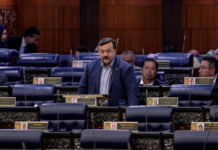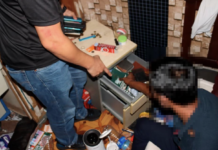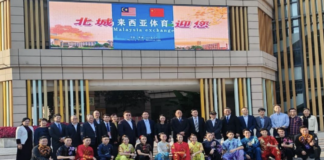KUALA LUMPUR, Dec 14 – Rosini Amal was forced to put her travel business on hold and switch to selling homemade cookies to make a living and pay her office rent after the Movement Control Order was imposed in March.
The MCO and subsequent conditional MCO, which were imposed to stem the transmission of the COVID-19 virus, resulted in nationwide travel restrictions and the closure of Malaysia’s international borders which impacted the tourism industry badly.
Rosini, 48, said many local travel and tour companies folded as they could not afford to pay their staff salaries, utility bills and rental for their office premises.
“Many of us suffered huge losses due to the cancellation of bookings and our services…previously the tourism sector was among the biggest contributors to the nation’s economy,” she told Bernama, adding that they had no other choice but to look for an alternative source of income as there is no telling when the pandemic will end.
Fortunately, Budget 2021 has proposed several initiatives to help revive the nation’s tourism sector, with RM200 million allocated to revitalise domestic tourism and the arts and culture industry.
While grateful for the budget initiatives, Rosini, however, hoped that the government would offer more assistance to relieve the financial burden of the industry players.
“Just providing allocations and tax relief is not enough. Tourism operations have been badly hit… many hotels have closed down. The plight of tourist guides, who have no EPF (Employees Provident Fund) savings, must also be looked into,” she added.
Under Budget 2021’s Tourism Recovery Plan, RM50 million has been allocated to provide training and placements for 8,000 employees of airline companies in Malaysia; RM50 million for maintenance and repair of tourism facilities; RM20 million to improve the infrastructure in cultural villages; and RM20 million for the conservation of national heritage buildings.
The Malaysia Healthcare Travel Council, meanwhile, has been allocated RM35 million to enhance the local medical tourism industry while companies in the tourism sector have been given Human Resource Development Fund (HRDF) levy exemptions for six months beginning January 2021.
Malaysia Association Tour Agency president Datuk Mohd Khalid Harun said while the association members were happy with the HRDF levy exemption and training for airline employees, next year’s budget, however, did not provide any initiative to help hotel workers who lost their jobs due to the COVID-19 crisis.
He said tourism industry players can now only depend on the National Economic Recovery Plan’s RM1 billion allocation to revive the tourism sector. The National Economic Recovery Plan or Penjana was unveiled by the government in June this year.
But, according to Mohd Khalid, so far only three percent of the fund has been approved for use.
Peninsular Malay Express Bus Operators Association president Mohamed Kaharrudin Salleh said his association members incurred losses amounting to some RM60 million a month following the enforcement of the MCO.
“We were hoping that Budget 2021 would offer initiatives to relieve our costs as we are saddled with the monthly installment payments for 737 express buses and salaries for 3,000 workers,” he said.
On the sales tax exemption on all new locally-assembled, air-conditioned bus purchases for two years starting January 2021, Mohamed Kaharrudin said it would benefit bus operators but, however, “we have already suffered losses, many of our buses are still not on the road so we are not thinking of adding more buses (to our fleet)”.
He also urged the government to direct banks and financial institutions to extend the moratorium period on loan repayments without imposing any extra interest charge until the nation’s economy recovers.
Mohd Noah Maideen, who is chief executive officer of e-hailing company MyCar, welcomed Budget 2021’s special RM1,000 grant to hawkers, traders and taxi drivers in Sabah but he had hoped that the government would also provide special incentives to e-hailing company staff to attend training courses to improve their marketing and smart application development skills.
“Apart from that, we also want the permit cost for the registration of each e-hailing car to be reduced from the current RM115 to RM30,” he said, adding that the high cost is preventing some e-hailing drivers from getting the permit.
Meanwhile, whilst speaking about the impact of the COVID-19 pandemic on the tourism industry at the Dewan Rakyat on Nov 23, Minister of Tourism, Arts and Culture Datuk Seri Nancy Shukri said 204 tourism business entities have wound up their operations since March this year.
She said based on data issued by the Companies Commission of Malaysia, 109 of the entities were hotels, resorts, motels and chalets while 95 were tourism agencies and operators of tourism activities.
Although the government has provided various incentives to revive the domestic tourism sector under Penjana, its recovery has yet to be satisfactory due to the ongoing pandemic.
Under Budget 2021, the Tourism, Arts and Culture Ministry has also been tasked with implementing the Cuti-Cuti Malaysia initiative whereby e-vouchers and discounts will be offered for hotel accommodation and transportation.
Nancy had also said that the Green Zone Domestic Travel Bubble initiative which began on Nov 22 is part of the government’s efforts to stimulate the recovery of the nation’s domestic tourism sector.
According to the minister, this initiative, which allows movements between green zones in the country, is in line with three main strategies under the government’s Tourism Recovery Plan, namely to restore the people’s confidence in travel, focus on reviving domestic tourism, as well as identify all products and come up with more creative offers by maximising the available resources.
















